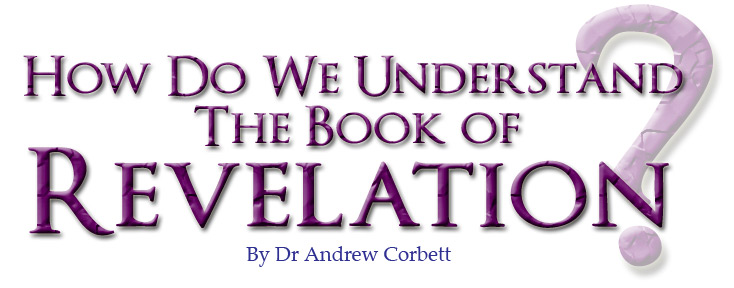
by Andrew Corbett | Jun 25, 2018 | Hermeneutics |
Professors Gordon Fee and Douglas Stuart state that the entire framework of the New Testament is eschatological (How To Read The Bible For All Its Worth, 2003:145). “Eschatology”, they write, “has to do with the end, when God brings this age to its close.” Hence my double entendre heading – Understanding what the Bible teaches about “finally” (Eschatology) is necessary in order to understand what the New Testament teaches…

by Andrew Corbett | Mar 16, 2018 | Book of Revelation |
Some scholars regard the language of Revelation as “apocalyptic”. By this, they mean- ultimate doom language presented in symbolic terms. If we accept this narrow definition as the working definition of “apocalyptic” then we are forced to reject the Book of Revelation as truly being apocalyptic language. The reason for this is that the Book of Revelation is not about the end of the world as much as it is about the end of something else.
Other scholars take a broader definition of the word apocalyptic and employ it to simply mean prophetic symbolism. Clearly the Book of Revelation is full of symbols. The challenge for the Bible student is to learn its language and interpret what the symbols mean. We do this by following the standard rules for sound Bible interpretation.

by Andrew Corbett | Mar 8, 2017 | Bible Prophecy |
There are several reasons why we can have confidence that the Bible is truly God’s divinely inspired, infallible, inerrant, Word to mankind. It is historically verifiable, it is experientially testable, it is philosophically credible, but perhaps one of the greatest evidences for the Bible being the divinely inspired Word of God, is fulfilled prophecy.
When the Dead Sea Scrolls were discovered in 1946, it gave the world irrefutable proof that the contents of the Book of Isaiah were undoubtedly written before the birth of Christ. This means that the passages of detailed prophecies with Isaiah about the coming Messiah must have been written before the Messiah, Jesus of Nazareth, actually came…

by Andrew Corbett | Feb 22, 2016 | Bible Prophecy |
“It was the best of times, it was the worst of times.” begins the Dickens’ classic, The Tale of Two Cities. For many End-Times preachers, these are the worst of times. This idea is reinforced repeatedly by many Christians who feel that the world is indeed getting worse and worse. When I have lectured on Ethics or Eschatology both here and abroad, I have been challenged by students who despair that Christians can not hope to have a godly influence on society since the Bible apparently says that the last days will be dark and full of rampant evil. I have generally responded to these claims by asking if there was another time in history in which they would rather have lived? When students think about it, they usually conclude that there is no better time to be alive than now. But this presents a dilemma for those Christians who have bought into the idea that these are the “worst of times”, because the evidence suggests that these are the best of times.
I’m a Preterist. I’m not a Futurist. This means that I consider the Bible needs to read and understood as it was intended. I consider this to be taking the Bible “literally”. This kind of literalism distinguishs between a metaphor, an allegory, poetic parallelism, narrative, and didactic prescriptions. I therefore regard Christ’s statements about His coming and the Kingdom of God being “near” and “at hand” as being intended to convey the idea that His coming and the Kingdom of God on earth was about to commence within the life-time of Christ’s original audience.

by Andrew Corbett | Feb 8, 2011 | Book of Revelation |
We all approach the Bible with certain ideas that color the way we read it. This is especially the case with the Book of Revelation. While certain parts of the Bible are difficult to understand (largely because we are separated by time, distance, language, personal disconnection and cultural practices), the Book of Revelation is particularly difficult to understand. This is borne out by the plethora of interpretations that have been offered about it.

by Andrew Corbett | Apr 7, 2007 | Bible Prophecy, Eschatology |
Some Fundamentalist Christians make wild claims about certain predictions they claim the Bible makes. Here’s what the Bible doesn’t predict!







